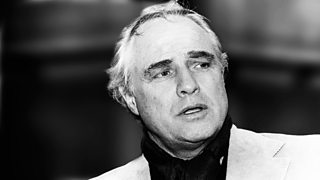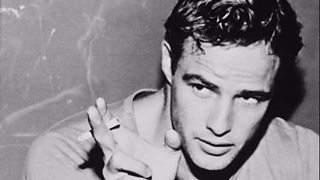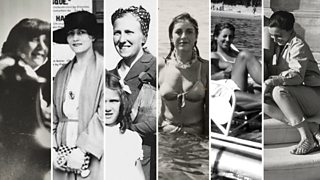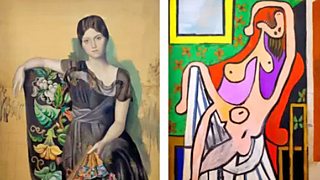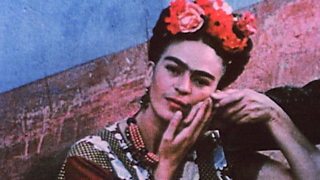The day I woke up Marlon Brando... Hollywood superstar (and secret Harry Lauder fan)
13 January 2017
As BBC Two celebrates the life and work of Hollywood giant Marlon Brando in the imagine... documentary Listen to Me Marlon, former BBC researcher FINDLAY McRAE describes an unforgettable phone conversation with the notoriously private star.
I picked up the telephone and dialed the LA voicemail number I’d found on the internet. As expected it rang and rang... and then someone answered. I was a little taken aback: it was 11am in the UK and by my calculations 3am in LA.
Brando hadn’t worked for years; he was fiercely private and notoriously difficult to deal with
“Oh, hello, can I speak to someone regarding Marlon Brando?” I heard myself say. A pause. “This is Marlon Brando,” came the reply.
“Oh, how are you?” I asked, with reckless abandon. “I was asleep, you’ve woken me up. Who are you and where are you from?” he asked in his unmistakable voice.
It was 2004 and I was working as a researcher on Hollywood Greats, presented by Jonathan Ross. We'd featured everyone from Kirk Douglas to Jimmy Stewart to Tom Cruise to Anthony Hopkins, but the one person we'd been chasing from series to series was Marlon Brando. People had come close but he’d become a recluse and disappeared from the public eye.
Brando was one of Hollywood’s true screen icons. He made a name for himself in films like A Streetcar Named Desire (1951), On The Waterfront (1954), Mutiny on the Bounty (1961), The Godfather (1972), and latterly Superman (1978) - where he was reportedly paid $3.7million for two weeks' work; considerably more than the lead actor, Christopher Reeve - and Apocalypse Now (1979), to name but a few.
Brando hadn’t worked for years; he was fiercely private and notoriously difficult to deal with. And there I was, a nervous twentysomething on the phone to the man himself. I said who I was and explained I was British, hoping that he would somehow find this endearing. “You don’t sound British,” he said. Slightly surprised, I explained that I was Scottish. As quick as a flash he said: “Can you say 'it's a braw bricht moonlicht nicht the nicht'?”
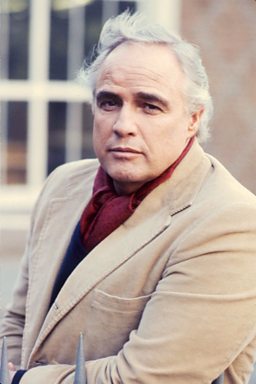
Now, you’d be forgiven for wondering why he’d asked me to say that phrase. It was a saying (meaning 'it's a lovely moonlit night tonight') made popular by the Scottish music hall entertainer Harry Lauder in the 1920s, and Brando was clearly a fan.
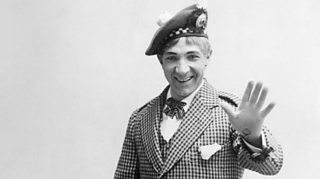
I can only imagine he was testing my Scottish credentials! Thankfully I repeated the phrase back and he chuckled. I had clearly passed the test.
I went on to explain why I had called him. “Call back in two weeks and I’ll give you an answer,” he grumbled.
I used the big boss’s office this time and my series producer sat in – mainly just to be nosey; who wouldn’t want to hear Marlon Brando’s voice? And true to his word, he took my call.
We spoke for about half an hour. He didn’t want to do the documentary and explained that he had become disillusioned with his career, and viewed acting as a means to an end. “Don’t get me wrong, it put food on the table and shoes on my kids’ feet, but I can’t walk down the street or go for a drink in a bar like you can,” he explained.
We talked about Harry Lauder. He really did like him, and spoke at length about the songs he performed. I was clueless but I didn’t care; I just listened while he chatted away. It was like talking to my grandfather. He was the nicest man.
As a thank-you I sent him a package with a book of Scottish landscapes, a tartan scarf, whisky and a CD of the Greatest Hits of Harry Lauder – in the vain hope that he would reconsider taking part. Sadly he didn’t, and a few months after my phone call he died.
But I will never forget the day I woke up Marlon Brando. At the time I don’t think I fully appreciated what a special phone call it was.
imagine...
-
![]()
Listen to Me Marlon
See Stevan Riley's award-winning documentary on Saturday 14 January, 21:00, BBC Two.
The Godfather speaks
-
![]()
Brando in his own words
10 key quotes and photos from the documentary.
More from BBC Arts
-
![]()
Picasso’s ex-factor
Who are the six women who shaped his life and work?
-
![]()
Quiz: Picasso or pixel?
Can you separate the AI fakes from genuine paintings by Pablo Picasso?
-
![]()
Frida: Fiery, fierce and passionate
The extraordinary life of Mexican artist Frida Kahlo, in her own words
-
![]()
Proms 2023: The best bits
From Yuja Wang to Northern Soul, handpicked stand-out moments from this year's Proms
